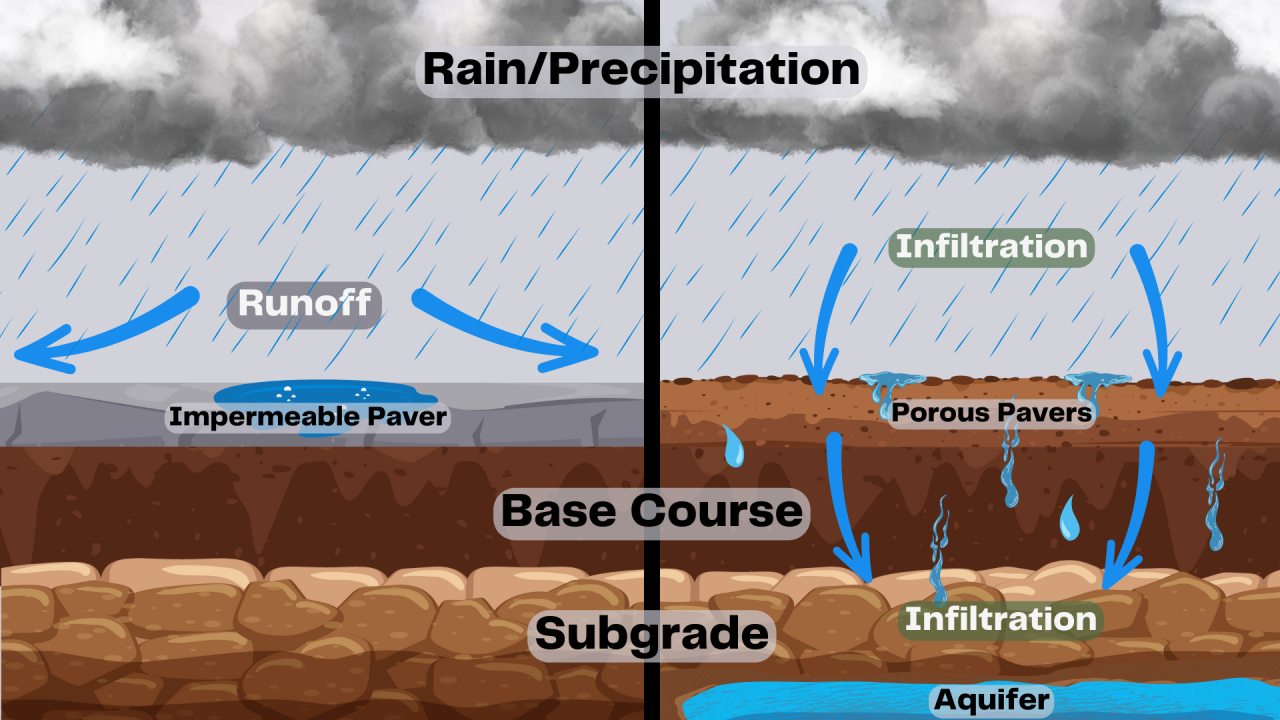Introduction
When it comes to choosing the right paving option for your project, several factors need to be considered. Cost is a significant concern, but so is environmental impact, longevity, and maintenance. Porous paving is a sustainable and economically competitive choice when compared to traditional paving options. In this blog, we’ll explore the costs of porous paving in comparison to other popular paving options, including concrete and asphalt, considering product costs, installation expenses, and long-term maintenance.
Understanding Porous Paving
Porous paving, also known as permeable paving, is a system designed to allow water to pass through the surface into a stone or gravel base below. Before delving into cost comparisons, it’s essential to understand what makes porous paving a sustainable choice. Porous paving, often made from recycled materials, allows rainwater to permeate through the surface and recharge the groundwater. This technology mitigates many environmental issues caused by impermeable surfaces, such as roads, parking lots, and driveways.
The primary benefits of porous paving include:
- Stormwater Management: Porous paving reduces stormwater runoff, preventing flooding and the contamination of natural water bodies with pollutants.
- Improved Water Quality: It filters pollutants and sediments from the water, enhancing water quality.
- Reduced Urban Heat Islands: Unlike asphalt or concrete, which absorb and radiate heat, porous paving materials help maintain cooler temperatures.
- Enhanced Aesthetics: Porous paving can be designed to be aesthetically pleasing, adding to the visual appeal of the property.
Cost Estimates Comparisons:
Products
- Porous Paving: Material costs for porous paving typically range from $2 to $5 per square foot, depending on the type of material and design complexity. Common materials include porous concrete, permeable pavers, and gravel.
- Concrete: Traditional concrete costs approximately $3 to $10 per square foot. While it’s initially cheaper than some porous paving options, the long-term costs can be significantly higher due to maintenance and potential issues with cracking and shifting.
- Asphalt: Asphalt is generally priced at $2 to $5 per square foot. However, asphalt is prone to deterioration over time, leading to resurfacing or replacement costs.
Installation
- Porous Paving: Installation costs for porous paving depend on the type of material, labor, and site preparation. On average, expect to pay around $3 to $8 per square foot for installation.
- Proper installation is crucial to ensure the pavement’s longevity and effectiveness.
Concrete: Concrete installation can range from $6 to $12 per square foot. This is due to the labor-intensive process and the need for concrete forms, which can be expensive. - Asphalt: Asphalt installation generally falls within the same range as porous paving, around $3 to $8 per square foot. However, it’s important to consider that asphalt surfaces require more frequent maintenance and may need resurfacing, adding to long-term costs.
Maintenance
- Porous Paving: The most significant cost advantage of porous paving lies in its minimal maintenance requirements. Occasional vacuuming and power washing to remove debris is usually sufficient. These costs are minimal compared to the long-term maintenance needed for concrete and asphalt surfaces. Routine maintenance, such as vacuuming and power washing to remove debris, typically costs between $100 to $500 per year.
- Concrete: Over time, concrete surfaces may crack or spall, necessitating costly repairs. Routine sealing is also required to prevent staining and deterioration, leading to higher maintenance costs. On average, expect to spend approximately $500 to $1,000 per year on concrete maintenance. Additionally, the routine sealing required to prevent staining and deterioration can cost around $300 to $700 every 2-3 years, adding to the overall maintenance expenses.
- Asphalt: Regular resealing and patching are essential for asphalt surfaces, in addition to the eventual need for resurfacing or replacement. These maintenance expenses can add up significantly, but relatively maintenance free to concrete. Porous asphalt requires more maintenance than regular porous paving, as it also requires vacuuming
Conclusion:
In the grand scheme of things, porous paving proves to be a cost-effective and sustainable choice when compared to traditional paving options like concrete and asphalt. While the initial product and installation costs may be slightly higher, the long-term savings and environmental benefits outweigh the initial investment.
Porous paving’s ability to reduce stormwater runoff, combat urban heat islands, and its low-maintenance nature make it an attractive option for both residential and commercial applications. When considering your next paving project, don’t just look at the initial cost; consider the long-term savings and environmental impact. Porous paving offers a win-win solution, providing both economic and ecological benefits.
For more information about the country’s #1 Porous Paving Systems Since 1982, and a completely customizable Underground Stormwater Storage System, see our Gravelpave2 or Grasspave2 pages.
